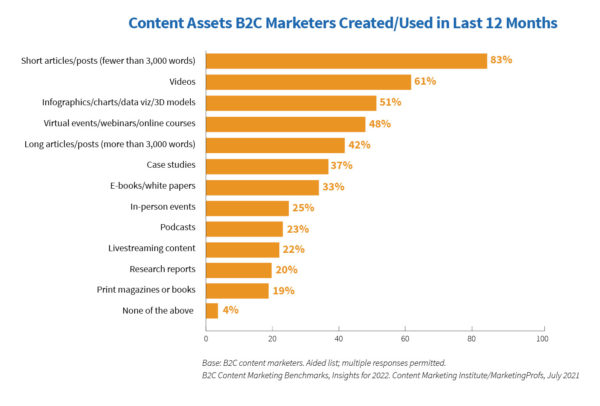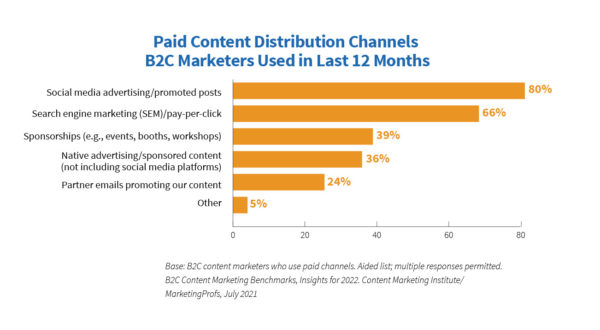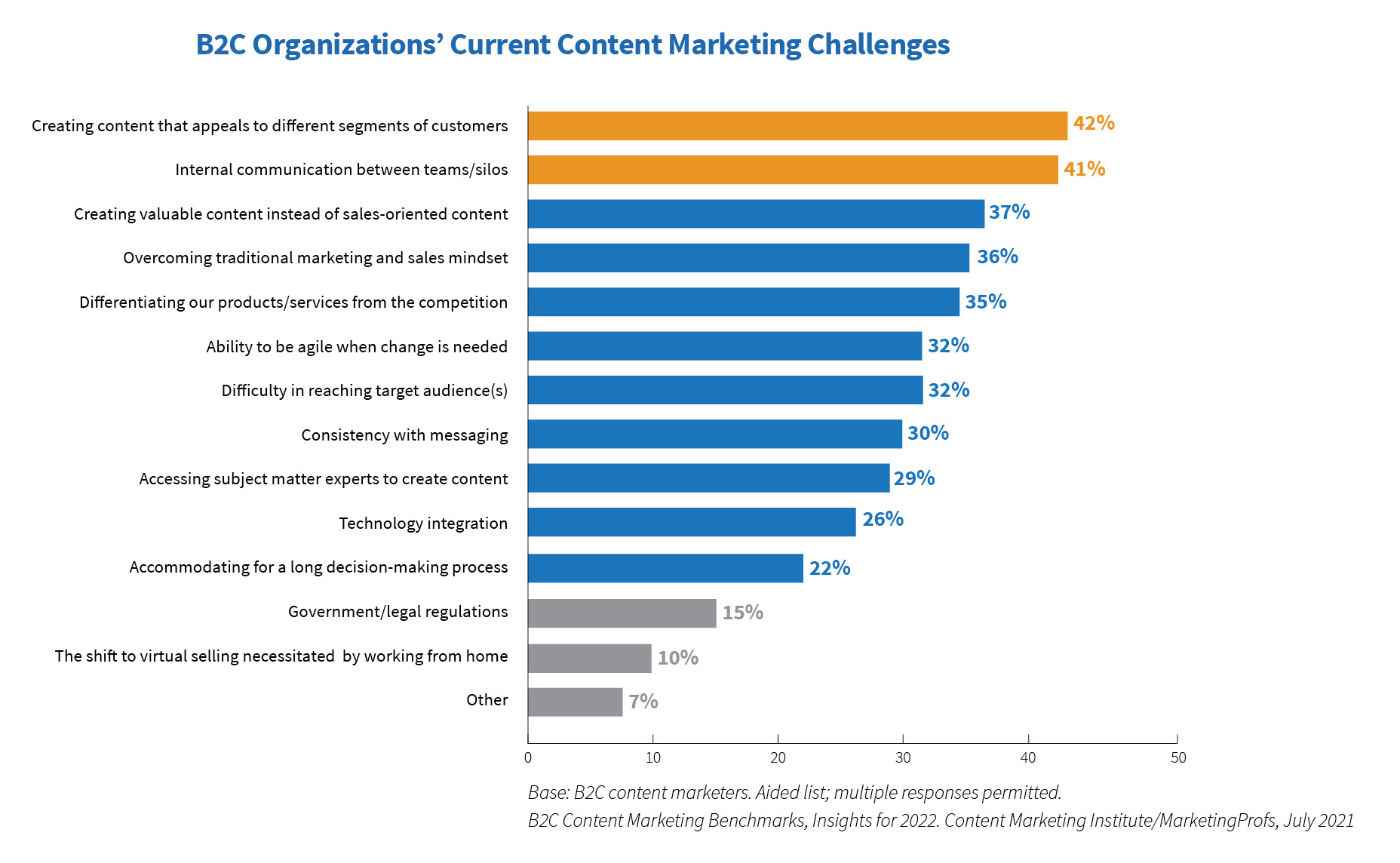 Editor’s note: We’ve updated our research study for 2023.
Editor’s note: We’ve updated our research study for 2023.
There’s a wonderful scene in the movie Indiana Jones and the Last Crusade when the rich investor, Walter Donovan, tries to convince Indy to go after the Holy Grail. He says, “We’re on the verge of completing a quest that began almost 2,000 years ago. We’re just one step away.” Indy responds, “That’s usually when the ground falls out from underneath your feet.”
When we released our 2021 B2C content marketing research, I noted the data showed the “imperative to develop direct, digital relationships with customers” became more important. But the pandemic making us all feel a little like Indiana Jones: “We’re making this up as we go.”
The pandemic and other events of 2020 had given marketers confidence in increasing the importance of content marketing. But, I noted, the responsibility coming from that power was important. If content marketers wanted to succeed, scale, and grow, they needed to help their businesses understand how to realize their “gut feeling” that better content was necessary through an intelligent and functional strategy.
Well, CMI’s B2C Content Marketing: Benchmarks, Budgets, and Trends – Insights for 2022 indicates that B2C marketers still struggle with some classic content marketing challenges.
What challenges lie in wait for 2022?
Well, let’s explore.
We’re just one step away
According to this latest Content Marketing Institute and MarketingProfs research, one in four (26%) of B2C marketers rate their content marketing as extremely or very successful. That is a big drop from the previous year when one in three (34%) reported the same.
About one-fourth of B2C marketers (26%) say their #ContentMarketing is extremely or very successful. That's fewer than one year ago (34%), according to @CMIContent #B2C #research via @Robert_Rose. Click To TweetYes, the pandemic continues to have a lot to do with this struggle. Talent acquisition has been more difficult. Priorities in digital transformation for sales enablement, e-commerce, and other customer experiences have deprioritized some content marketing initiatives.
Content marketing strategies for 79% of B2C marketers have changed at least slightly since the pandemic, while 20% of marketers say they’re implementing strategies that are extremely or very different.
Things are, indeed, both the same and very different.
Make sure the ground doesn’t fall away
Indiana Jones always survives the ground falling out beneath him because he’s always aware that it might. He prepares.
That’s why what I said in last year’s research bears repeating: “(I)t’s no longer good enough for content marketers to simply understand how to create blogs, infographics, or other media assets. We need to understand how solid planning of content operations (across ALL of marketing and communications) fits into our ongoing approach. That means understanding technology, governance, and how to structure content so that it can be reused, repackaged, and leveraged across silos.”
We see content marketers wearing more hats, and this is only going to continue in 2022. As content marketing grows as a multi-discipline practice and becomes an important part of our business strategy, detailing the “planning” and “preparation” part of that strategy is how we stay on solid ground.
Data from this year’s research points the way into some of that preparation.
Investment in video here to stay
As they did last year, short articles/posts topped the list of content types used by content marketers. Most other content types remained steady compared with the last few years, with the obvious exception of in-person events and one less-expected difference – long-form articles, which almost doubled in usage (42% vs. 22% the previous year).
As far as budget this year, 61% of marketers say their 2022 content marketing budget will be higher than their 2021 budget. Where will they be spending money? Seventy-two percent expect to invest in video, followed by paid media (51%).
Certainly the rise of TikTok as the most popular site on the internet and the ongoing trend of live video replacing in-person events largely drive this trend. This is something we’ve seen across both B2B and B2C – most notably with companies like Salesforce, which launched a video streaming platform as a marketing initiative.
72% of #B2C marketers plan to invest in #video in 2022, according to new @CMIContent #B2C #research via @Robert_Rose. Click To TweetGiven all companies have gotten this memo, differentiating and piercing the noise has become ever more difficult. So, paid media has become to become incredibly important in content marketing.
Paid media promotion increases
Over three-fourths (78%) of B2C marketers say they used paid methods to promote content in the previous year. Forty-three percent reported increasing their spending on paid promotion over the last 12 months.
Where are they buying? Paid social media advertising/promoted posts top the list (80%) followed by search engine marketing/pay-per-click (66%). Rounding out the top five involves a precipitous drop to sponsorships (39%), native advertising/sponsored content (36%), and partner email content promotions (24%).
#B2C marketers most often use #SocialMedia advertising/promoted posts as their top paid content distribution method, according to new @CMIContent #research via @Robert_Rose. Click To TweetThe results here are not surprising. As we’ve discussed for many years, social media strategies are clearly becoming paid media strategies – and we’ve seen many companies move much of their paid promotion to social media networks.
Time to double down on content operations
As I mentioned in the beginning, we’re close to reaching the Holy Grail. Content marketing has been recognized as a functional and active strategy. Even though we aren’t seeing marketing-related media, such as Adweek or Adage, reporting on the practice as much as we’d like, we are seeing the effects of this strategy. If you need the success stories, just ask us.
Whether it’s building a media company in your business, or branded content, or building your content studio, content marketing is an increasingly important piece of the B2C marketing strategy.
Although most B2C marketers report success with content marketing, the challenges are the same as they’ve been. The two most frequently cited are creating content that appeals to different segments within the target audience (42%) and internal communication between teams/silos (41%).
Both of those top two challenges speak to the internal operations of content and the development process. Our research points to continued transformational shifts that make content marketing an ever more important part of the integrated marketing mix.
In today’s modern business, everyone creates content — from the web team to the product team, brand team, demand-gen executives, even frontline account representatives. It’s probably easier to count who doesn’t create content-driven experiences for customers these days.
But we must realize that this explosive trend is actually our quest. Our attempts to complete it require us to develop not just great content, but an operational strategy that supports all content. Without a strategy, an inconsistent voice and inability to measure success will lead to the ground crumbling underneath us.
HANDPICKED RELATED CONTENT:
Keep your eye on the real prize
My Advice? Preparation.
It’s not the sexiest part, but a scalable, successful, and differentiating content marketing operation will help you more easily create, manage, activate, and measure digital content. You will define success by how well the content marketing strategy empowers everybody on the front line (sales, account reps, executives, and even accounting and legal) to tell your stories — and the best “next stories” — to your audience.
In many ways, we have to learn the same lesson as Indiana Jones at the end of The Last Crusade. He was so close to getting the prize that he became obsessed with it. He saves himself from the ground falling from beneath him by letting it all go and realizing the quest wasn’t about his prize. The journey was about saving everyone around him.
A strategic content marketing operation isn’t the storyteller of the business. It’s what enables everyone else to be the storytellers.
Cover image by Joseph Kalinowski/Content Marketing Institute





